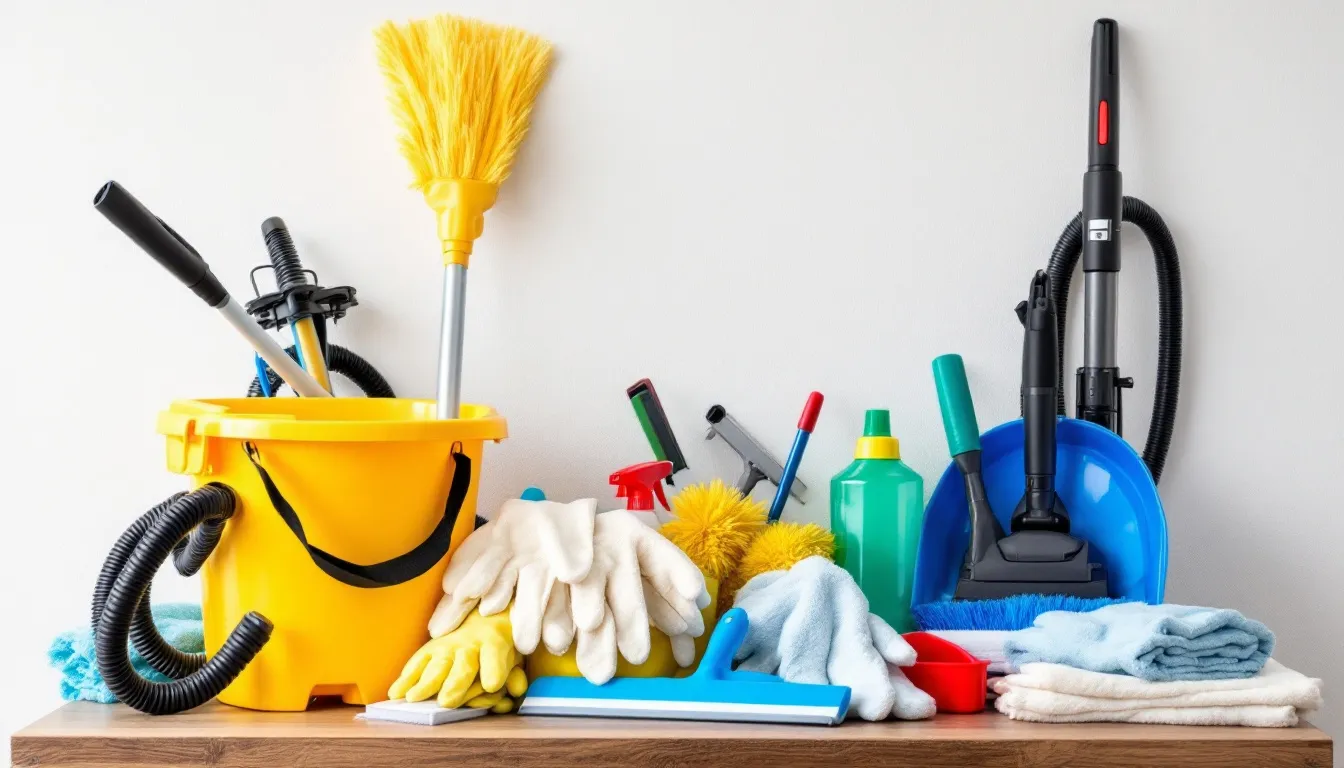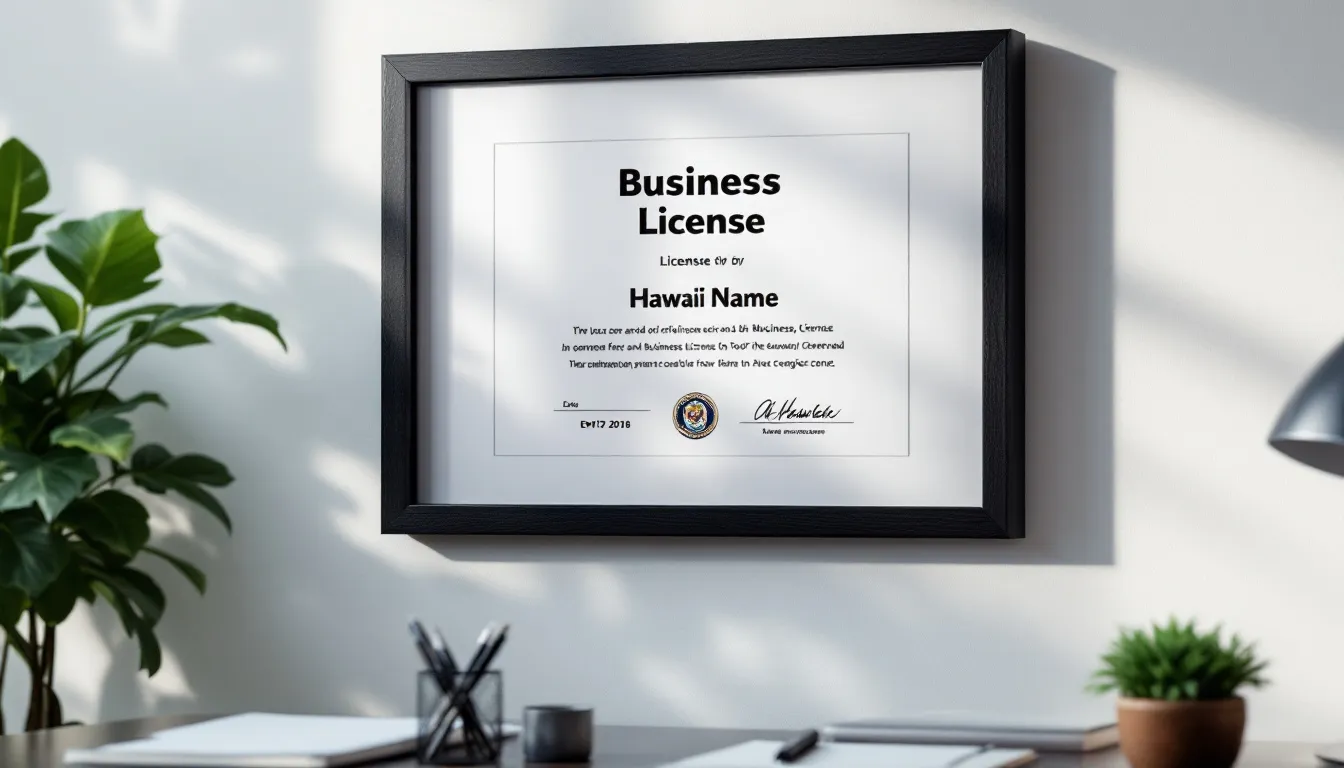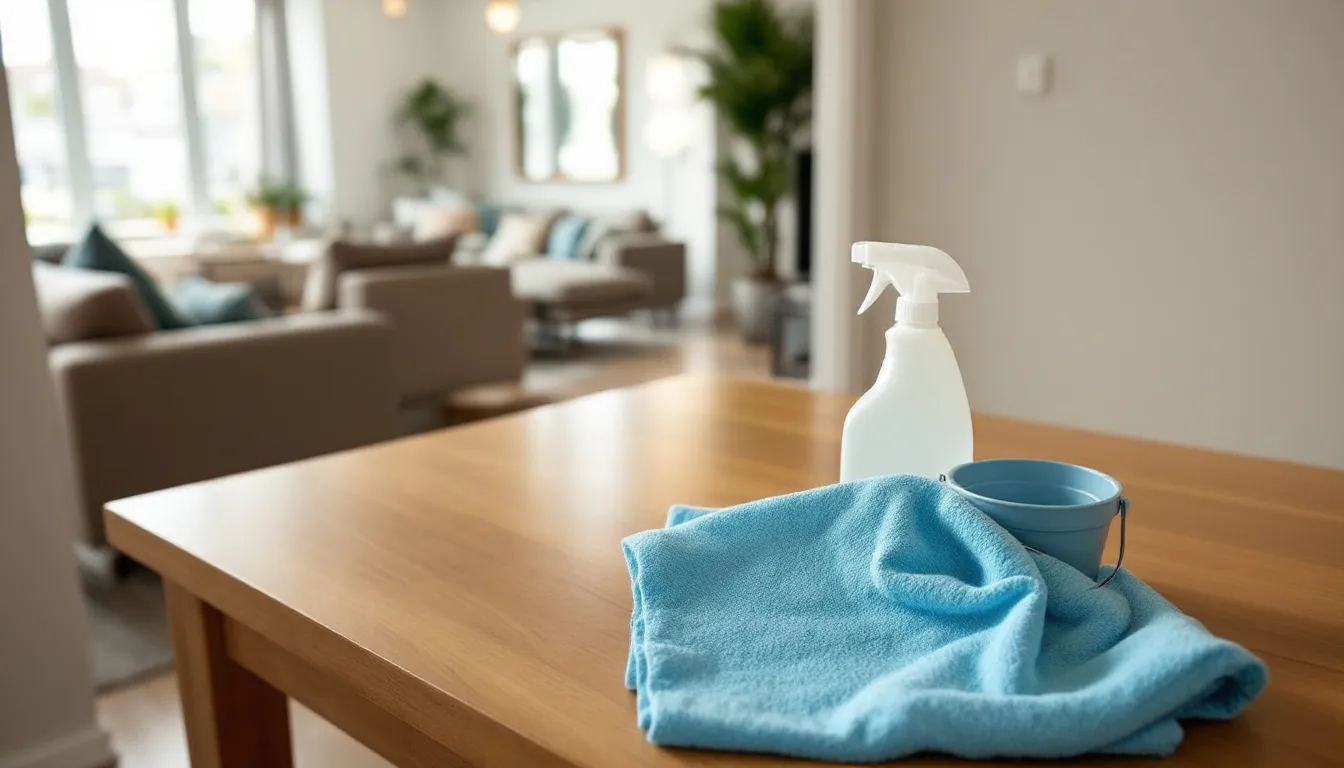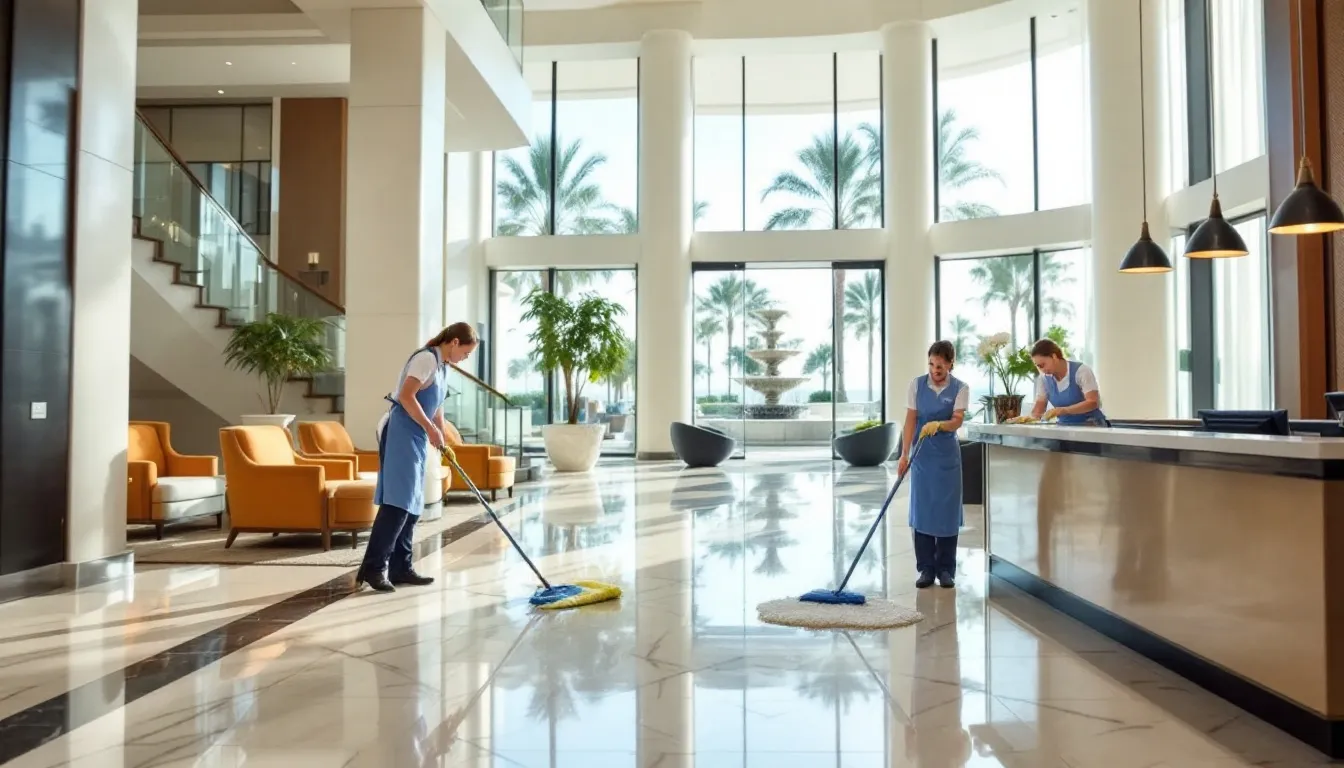Hawaii’s thriving tourism industry and expanding residential market create exceptional opportunities for entrepreneurs looking to start a cleaning business. With the state’s projected industry growth of 6.2% through 2030 and hourly rates ranging from $30-$50, the cleaning business sector offers promising potential for those ready to navigate Hawaii’s unique regulatory landscape.
Starting a cleaning business in Hawaii requires understanding specific state requirements that differ significantly from mainland operations. From the Hawaii Department of Commerce and Consumer Affairs registration process to the state’s distinctive General Excise Tax system, success depends on proper planning and compliance with local regulations.
This comprehensive guide walks you through every essential step, from business registration through the Hawaii Business Express portal to building a profitable cleaning business that can thrive across Hawaii’s islands. Whether you’re planning to focus on residential services, commercial cleaning, or the lucrative vacation rental market, you’ll discover the exact requirements, costs, and strategies needed to establish your cleaning business successfully.
Essential Requirements for Hawaii Cleaning Businesses
Hawaii’s business registration process operates differently from most states, requiring all businesses to register through the centralized Hawaii Business Express online portal managed by the Hawaii Department of Commerce and Consumer Affairs. This system streamlines business formation, licensing, and tax registration into a single digital platform.
Unlike many states, Hawaii doesn’t require a “Doing Business As” (DBA) registration if you operate your cleaning business using your full legal name. However, if you plan to operate under a trade name like “Aloha Clean Services,” you’ll need to register that name through the business registration division to protect your brand and ensure legal compliance.

Hawaii operates under a General Excise Tax (GET) system rather than traditional sales tax, which significantly impacts how cleaning businesses handle taxation. The GET applies to gross receipts at 4% statewide, with additional county surcharges up to 0.5% in areas like Honolulu. This means your cleaning company will pay tax on all income received, not just on taxable goods sold.
For cleaning businesses, the choice between residential and commercial services affects regulatory requirements and market positioning. Residential cleaning typically involves fewer compliance requirements but may require building trust within Hawaii’s tight-knit island communities. Commercial cleaning often demands higher insurance coverage and may require specialized certifications, particularly for healthcare facilities or food service establishments.
The state business license requirement applies to all cleaning businesses regardless of size or service type. Processing times through Hawaii Business Express typically range from immediate for basic registrations to several weeks for complex business entity structures requiring additional verification.
Step-by-Step Business Registration Process
The Hawaii Business Express portal serves as your primary access point for all business registration activities. Before proceeding with registration, you’ll need to conduct a business name search to verify availability and ensure your chosen name doesn’t conflict with existing registered businesses in Hawaii.
To begin the registration process, navigate to the Hawaii Business Express website and create a secure account. The system requires verification of your identity and will guide you through each step of the filing process. You’ll need to provide basic information about your business, including your intended business entity type and primary business activities.
Choosing your business structure significantly impacts your legal protection and tax obligations. A sole proprietor structure offers the simplest setup but provides no liability protection if customers claim property damage or injury. An LLC provides liability protection while maintaining tax simplicity, making it popular among small cleaning businesses. Corporation structures offer maximum protection but require more complex tax filings and ongoing compliance requirements.

The required forms vary based on your chosen business entity type. Sole proprietorships typically require only basic registration information, while LLCs need articles of organization and may require an operating agreement. Corporations must file articles of incorporation and establish bylaws. Partnership structures require partnership agreements, though Hawaii doesn’t mandate filing these with the state.
Registration fees range from $50 for basic sole proprietorship registration to $100 for LLC formation and $50 for corporation filing fees. Additional fees may apply for expedited processing or certified copies of registration documents. The online system accepts secure payment methods and provides immediate receipt confirmation for most filings.
Upon successful submission, you’ll receive verification that your registration is complete. For basic registrations, approval is often immediate, while more complex entity types may require additional review time. The system will provide you with your official state business registration number, which you’ll need for tax registration and licensing activities.
Hawaii Tax Requirements and Compliance
Hawaii’s General Excise Tax system requires registration through the Hawaii Department of Taxation, which is accessible through the same Hawaii Business Express portal used for business registration. The GET applies to virtually all business income, including cleaning services, at a base rate of 4% plus applicable county surcharges.
Residential cleaning services enjoy a significant advantage in Hawaii’s tax structure: they’re exempt from collecting sales taxes from customers. This means you don’t add tax to customer invoices for standard residential cleaning services. However, your business still owes GET on all gross receipts received, making accurate record-keeping essential for tax compliance.
Self-employment tax obligations apply to sole proprietors and LLC members, requiring quarterly estimated tax payments to both federal and state taxation authorities. Hawaii requires these payments if you expect to owe more than $500 in annual tax. The state provides online filing systems and automatic payment options to simplify this process.
Registration with the Hawaii Department of Taxation happens simultaneously with business registration when using Hawaii Business Express. You’ll receive a Hawaii Tax ID number that enables you to file returns and make payments through the state’s online tax system. This integration streamlines the startup process and ensures proper tax compliance from day one.

Record-keeping requirements demand maintaining detailed documentation of all business income and expenses. Hawaii tax authorities expect businesses to preserve records for at least six years, including customer invoices, supply receipts, equipment purchases, and vehicle expenses. Digital record-keeping systems can simplify this process while ensuring you have necessary documentation if questions arise.
The state provides resources and assistance for new businesses navigating tax requirements. Small business owners can access free workshops and online resources through the Department of Taxation to understand their obligations and avoid common compliance mistakes that could result in penalties or interest charges.
Licensing and Permits
The state business license requirement applies universally to cleaning businesses operating in Hawaii, obtained through the Hawaii Business Express portal during your initial registration process. This license authorizes your business to operate legally within the state and must be renewed according to state requirements.
Unlike many mainland locations, Hawaii doesn’t require city and county licenses specifically for cleaning businesses. This simplification reduces regulatory burden and startup costs for new cleaning companies. However, you should verify with your specific county offices that no additional local permits apply to your particular services or business location.
Trade name ownership in Hawaii operates under a “first-use” protection system rather than requiring formal registration. If you operate under your legal name, no additional filings are necessary. For businesses using trade names, registering through the business registration division provides legal protection and prevents others from using your chosen business name.

Specialized cleaning services may require additional permits beyond the basic state business license. Businesses offering biohazard cleanup, medical facility cleaning, or food service establishment cleaning might need health department permits or specialized certifications. Research your intended service offerings to ensure full compliance with applicable regulations.
The Department of Commerce and Consumer Affairs provides guidance on when additional permits might be required. Their website offers resources to help cleaning businesses understand the full scope of their licensing obligations. When in doubt, contacting the department directly can provide clarity and prevent compliance issues later.
Professional licensing doesn’t apply to basic cleaning services in Hawaii, but certain specialized services may require technician certifications. For example, carpet cleaning using certain chemicals might require safety certifications, while mold remediation services need specialized training and permits.
Insurance and Bonding Requirements
General liability insurance represents the most critical coverage for cleaning businesses operating in Hawaii. This protection covers property damage claims, such as broken items during cleaning, and bodily injury claims if someone is hurt on a property you’re servicing. Most commercial and residential clients require proof of liability insurance before agreeing to cleaning services.
Workers’ compensation insurance becomes mandatory when you hire employees, regardless of the number of workers. Hawaii law requires this coverage to protect employees injured while working and to shield your business from related lawsuits. Even solo operators should consider personal injury coverage due to the physical demands of cleaning work.
Commercial auto insurance protects vehicles used for your cleaning business, including coverage for equipment and supplies transported to job sites. Standard personal auto insurance typically excludes business use, making commercial coverage essential for legal protection and business continuity.

Surety bonding provides additional client protection and can differentiate your cleaning company from competitors. Bonding guarantees compensation to clients if employees steal or damage property beyond your insurance coverage. Many commercial clients and high-end residential customers prefer bonded cleaning services.
Hawaii-specific insurance providers understand local market conditions and can offer competitive rates for cleaning businesses. Local agents familiar with Hawaii’s business environment can help identify coverage gaps and ensure adequate protection for island-specific risks like natural disasters or supply chain disruptions.
Insurance costs vary based on coverage levels and business size, but basic liability coverage typically ranges from $39-$69 monthly for small cleaning operations. Working with local insurance professionals helps ensure you have appropriate coverage while managing costs effectively for your specific business model and risk profile.
Island-Specific Business Considerations
Transportation challenges between islands significantly impact service area planning and business scalability. Most cleaning businesses focus on single-island operations initially, as inter-island travel for routine cleaning services isn’t economically viable. This geographic limitation requires careful market analysis to ensure sufficient customer density within your chosen island.
Higher costs for supplies and equipment result from Hawaii’s isolated location and dependence on imported goods. Cleaning supplies, equipment, and replacement parts often cost 20-30% more than mainland prices due to shipping expenses. This impacts both startup costs and ongoing operational expenses, requiring careful pricing strategies to maintain profitability.
Seasonal tourism creates significant opportunities and challenges for cleaning businesses. The peak tourist season drives demand for vacation rental cleaning and hotel services, while slower periods may reduce commercial cleaning opportunities. Understanding these cycles helps with cash flow planning and staffing decisions throughout the year.

Competition from established local cleaning services requires strategic positioning and relationship building. Hawaii’s markets often favor businesses with strong community connections and local reputation. Building relationships with property managers, real estate agents, and hotel chains can provide steady commercial work and referral opportunities.
Building relationships with property management companies represents a crucial growth strategy. Many properties, from vacation rentals to apartment complexes, rely on cleaning services for tenant turnovers and maintenance. Establishing these connections early can provide steady income streams and business growth opportunities.
The state’s environmental consciousness creates opportunities for eco-friendly cleaning services. Many Hawaii residents and businesses prefer environmentally responsible cleaning products and methods. Positioning your cleaning company as environmentally conscious can attract customers who prioritize sustainability and environmental protection.
Growth Opportunities in Hawaii’s Market
Vacation rental cleaning services offer exceptional growth potential due to Hawaii’s massive tourism industry. Properties listed on platforms like Airbnb and Vrbo require professional cleaning between guests, creating consistent demand for reliable cleaning services. These services often command premium rates and provide predictable scheduling opportunities.
Commercial cleaning for hotels, resorts, and hospitality businesses represents a substantial market segment. Hawaii’s tourism industry requires high standards of cleanliness, creating opportunities for cleaning companies that can meet stringent hospitality requirements. These contracts often provide stable, long-term income with regular payment schedules.
Specialized services like post-construction cleaning and move-out cleaning command higher rates and face less competition than standard residential cleaning. Hawaii’s active construction market and high residential mobility create regular demand for these specialized services, which require additional skills but offer improved profit margins.

Eco-friendly cleaning services appeal strongly to Hawaii’s environmentally conscious market. Using biodegradable products, reducing chemical usage, and implementing sustainable practices can differentiate your cleaning company and attract customers willing to pay premium rates for environmentally responsible services.
Scaling strategies for multi-island operations require significant planning and capital investment. Successful expansion typically involves establishing strong operations on one island before expanding to others. This might include partnering with local operators or franchising your proven business model to qualified operators on other islands.
Franchise opportunities exist for entrepreneurs interested in proven business models and ongoing support. Several national cleaning franchises operate in Hawaii, offering training, marketing support, and established operational systems. While franchise fees and royalties reduce profit margins, they provide proven systems and brand recognition that can accelerate growth.
The cleaning business industry in Hawaii continues growing alongside tourism recovery and residential development. Market research indicates sustained demand for professional cleaning services across all sectors, making this an opportune time to start a cleaning business in Hawaii’s dynamic market environment.
Understanding local culture and building community connections remains essential for long-term success. Hawaii’s business environment rewards companies that demonstrate commitment to the local community and respect for Hawaiian values. This cultural awareness can become a significant competitive advantage in building a sustainable cleaning business.
Starting a cleaning business in Hawaii requires careful attention to state-specific requirements, from navigation of the Hawaii Business Express portal to understanding the General Excise Tax system. However, the state’s growing tourism industry, active real estate market, and supportive business environment create excellent opportunities for well-planned cleaning companies.
Success depends on thorough preparation, proper registration and licensing, adequate insurance coverage, and strategic positioning within Hawaii’s unique market conditions. By following the steps outlined in this guide and adapting to local market demands, you can build a profitable cleaning business that serves Hawaii’s diverse residential and commercial markets effectively.